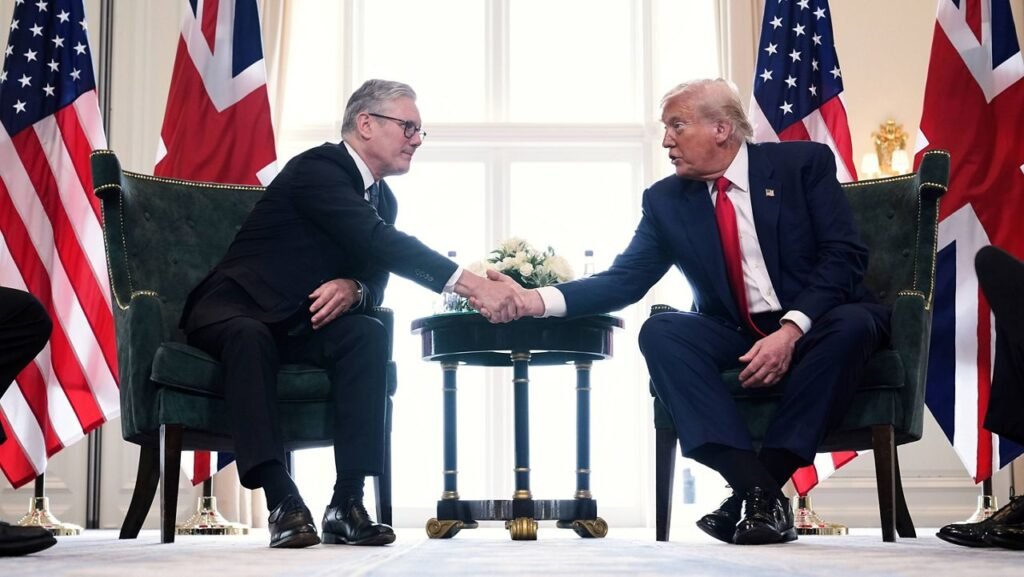Trump and UK PM on Gaza starvation became a central topic in global headlines this week as former U.S. President Donald Trump and the British Prime Minister held a crucial discussion. Their meeting focused on two major concerns shaking the international stage: the deepening starvation crisis in Gaza and rising global tensions caused by trade tariffs.
With millions in Gaza facing food shortages and essential supplies blocked due to ongoing conflict, and with tariffs threatening the stability of global trade, the leaders’ dialogue has drawn serious attention from humanitarian groups and economic analysts alike.
Humanitarian Crisis in Gaza: A Joint Call for Action
Gaza’s Dire Situation
The humanitarian crisis in Gaza has reached extreme levels. According to the United Nations and several aid organizations, millions of Palestinians are on the brink of famine due to prolonged conflict, restricted access to aid, and damaged infrastructure. Starvation, lack of clean water, and inadequate medical care are some of the key issues the region is facing.
Trump, known for his hardline stance on foreign affairs during his presidency, acknowledged the growing pressure from international communities to address the crisis. He said the “starvation in Gaza must be resolved immediately, and aid must be allowed in without political games.”
The British PM echoed this sentiment, stating, “This is not a political problem anymore—it’s a human crisis. The world must act, and we are ready to do our part.”
Focus on Humanitarian Aid Corridors
During the meeting, both leaders agreed that humanitarian aid corridors must be urgently established. These corridors would ensure the safe passage of food, medicine, and other essentials into Gaza without interference.
- Trump suggested that private-sector partnerships might help speed up the process.
- The UK PM proposed using international watchdogs to oversee distribution and avoid diversion by armed groups.
By involving neutral third parties, both leaders hope to increase trust and transparency in the delivery of aid.
Trade Tensions: Tariffs on the Global Stage
Revisiting Tariff Policies
In addition to discussing Gaza, the two leaders also turned their attention to tariffs and international trade—a topic close to Trump’s economic strategy during his time in office. The former president remains critical of trade policies that he believes harm American industries.
“Tariffs protect our jobs and national interest,” Trump said. “We’re not going to let other countries take advantage of us anymore.”
The UK PM, however, pushed for more cooperative trade relations, warning that escalating tariffs could backfire and hurt global supply chains, especially post-Brexit.
The conversation revealed a clash of ideologies—protectionism versus global cooperation—but also a willingness to find common ground.
Potential Impact on US-UK Trade
The two leaders reportedly discussed revising U.S.–UK trade agreements to make them more favorable post-Brexit. Discussions included:
- Possible reductions in tariffs on agricultural goods and pharmaceuticals.
- Joint strategies to counter Chinese trade practices.
- Streamlining regulatory standards to encourage cross-border investments.
While no official agreements were signed, sources close to the talks suggest that preliminary groundwork for future negotiations has been laid.
Global Reactions and Diplomatic Signals
Mixed Reactions from Allies
The joint statement on Gaza starvation and tariff talks received mixed reactions:
- European Union leaders welcomed the humanitarian stance but warned against any move that could politicize aid delivery.
- Middle Eastern countries appreciated the renewed focus on Gaza but urged that real action must follow the words.
- China and Russia viewed the tariff discussions as a potential revival of U.S.-led economic blocs.
The diplomatic message was clear: The West is preparing to take a firmer, united stance on both humanitarian and economic fronts.
Strategic Timing
Some analysts believe the meeting’s timing was not coincidental. With ongoing conflicts in the Middle East and increasing global economic instability, both Trump and the UK PM may be aiming to position themselves as strong international voices ahead of major elections in their respective countries.
Trump’s Return to the Global Stage?

Though no longer president, Donald Trump’s continued involvement in international discussions signals his active interest in influencing U.S. foreign policy. His statements on Gaza and trade were widely shared on social media and quoted in major news outlets.
He has been criticized in the past for controversial decisions in the Middle East, including moving the U.S. embassy to Jerusalem and cutting aid to Palestinian refugees. This renewed concern about Gaza may be seen as an attempt to reshape his legacy or prepare for a political comeback.
Challenges Ahead: Will Promises Turn into Action?
Despite the promising rhetoric, many experts remain skeptical. History has shown that words often fail to turn into action, especially when international politics are involved.
Key challenges include:
- Logistics of aid delivery into a heavily restricted war zone.
- Political friction between Israel, Palestine, and international stakeholders.
- The complex nature of tariff negotiations, which often take years.
Nonetheless, the joint discussion marks a step forward in two areas that desperately need global attention.
What This Means for Ordinary People
For readers in the U.S., UK, and beyond, this diplomatic dialogue could have real-world implications:
- Lower tariffs might reduce prices on imported goods like electronics, medicine, and food.
- A successful humanitarian effort in Gaza could ease tensions and reduce the likelihood of broader regional conflicts.
- Renewed U.S.–UK cooperation might bring economic benefits, such as jobs and new trade opportunities.
Hope Amid Crisis
The recent conversation between President Donald Trump and the British Prime Minister may not have solved the world’s problems overnight, but it certainly brought attention to two urgent issues—Gaza starvation and trade tariffs.
By highlighting the human cost of conflict and the economic challenges of protectionism, the meeting served as a reminder that diplomacy still matters. Whether these discussions lead to real change remains to be seen, but for now, the world is watching—and hoping.
Read Next – EU Officials Respond to Trump’s Tariffs as Trade Deal Reshapes Global Market






